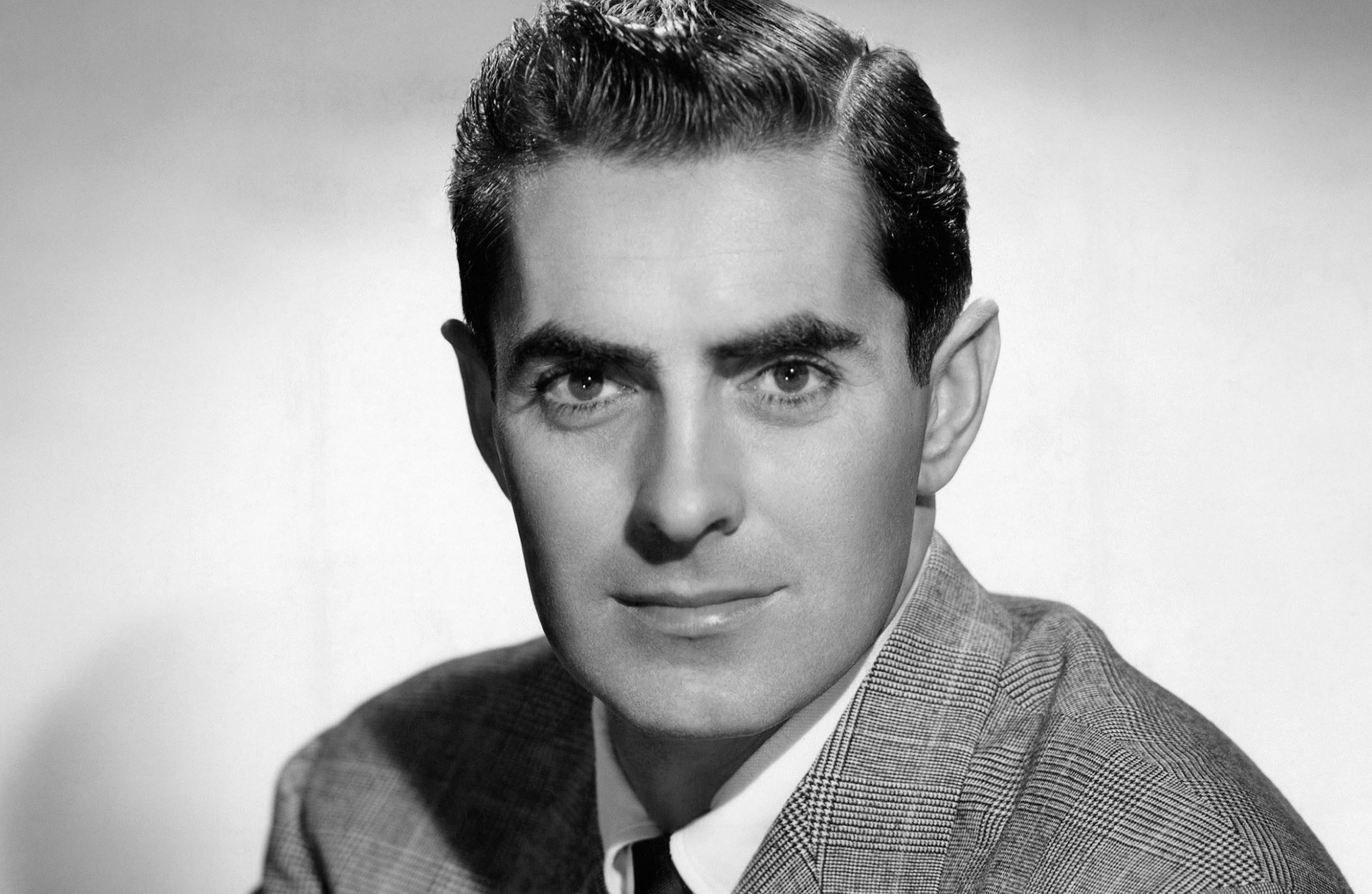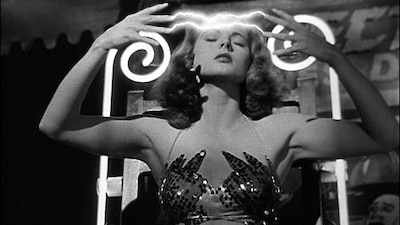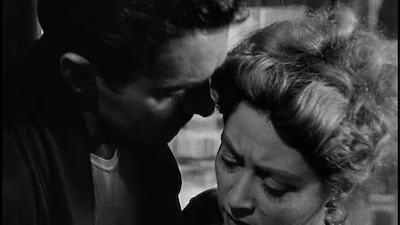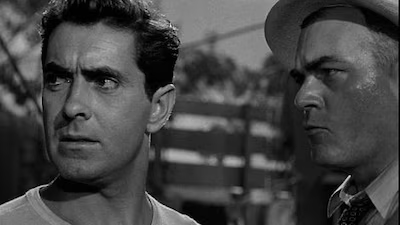Tyrone Power

About
Biography
Filmography
Family & Companions
Bibliography
Biography
A dashing lead in adventure films and romances, Tyrone Power was one of Hollywood's most popular actors from the late 1930s until the mid-1950s and the pride of 20th Century Fox, his home studio. Power was, after all, one of the few matinee idols to give MGM's Clark Gable and Warner Bros.' Errol Flynn a run for their money as resident sex symbol; someone who could pull in as many female as male moviegoers. His handsome, chiseled features and natural athleticism made him a natural for swashbuckling fare like "The Mark of Zorro" (1940) and "The Black Swan" (1942), but he was well equipped for almost any genre - from westerns and crime dramas, to light comedies and musicals. Though one of the Top 10 box office draws for years, Power yearned for more respectable fare, and after serving in World War II, made a bid for dramatic roles in films like "The Razor's Edge" (1946) and the disturbing "Nightmare Alley" (1947). As he aged, Power turned his attention to stage acting in the 1950s, where he achieved success in productions of "John Brown's Body" and "Mister Roberts;" His film career ended on a high note with Billy Wilder's "Witness for the Prosecution" (1957) before his untimely death the following year from a heart attack at the age of 44 - one of the first actors from the Golden Age to die prematurely.
Born Tyrone Edmund Power, Jr. on May 5, 1914, he was one of several members of his family who chose acting as their profession. His great-grandfather was the acclaimed 19th-century Irish stage actor William Tyrone Power, and his parents, Frederick Tyrone Power and Helen Emma "Patia" Reaume, were both established stage and screen actors. Various family members also connected him through marriage or blood to Sir Laurence Olivier and author Evelyn Waugh. A sickly child in his early years, the family relocated from his birthplace of Cincinnati, OH to California for his health; a sister, Anne, was born there in 1915. Power's father (later known as Tyrone Power, Sr.) was frequently away from home due to stage commitments, and the distance contributed to his divorce from Reaume in 1920. Power's mother found regular work as a stage actress in Los Angeles, and Power himself made his acting debut at age seven in one of her plays. They later returned to Cincinnati to live with Reaume's sister; Power graduated from high school in 1931 and decided to follow in his parents' footsteps. He sought out his estranged father for advice, and appeared in a production of "The Merchant of Venice" with him in Chicago before his death in 1931.
Power headed for California to find work in the movies; his father's name opened a few doors for him, but yielded little work beyond roles as a glorified extra. Discouraged, he headed for New York City to try his hand on the stage. While there, he earned his first big break through actress Katherine Cornell, who cast him as understudy to Burgess Meredith in the play "Flowers of the Forest" before giving him more substantial roles in "Romeo and Juliet" and "Saint Joan." Hollywood scouts caught his performances and offered him a screen test at 20th Century Fox, where he was signed in 1936.
His screen debut was met with disaster; cast opposite popular singer-actress Alice Faye in the musical "Sing, Baby, Sing" (1936), he was fired by director Sidney Lansfield, who bluntly suggested that he find another line of work. But Faye, who had recommended Power for the part, encouraged Fox to stick with Power, and he soon found regular work as a supporting player in light comedies and musicals like "Girls' Dormitory" (1936) and "Ladies in Love" (1936). Cast mainly for his dark good looks, he made an impression on audiences and columnists like Hedda Hopper. The substantial press he received helped earn Power his first leading role in the 1936 period adventure "Lloyd's of London," which officially minted him as a star.
By the following year, Power was one of Fox's biggest box office draws, and the studio placed him in every conceivable genre of film. He was an agreeable musical performer in the Sonja Henie vehicle "Thin Ice" (1937) and the Irving Berlin musical "Alexander's Ragtime Band" (1938), for which Power sang the title track, and proved himself capable in both westerns - as the title role in 1939's "Jesse James" - and noir like "Johnny Apollo" (1940). Audiences responded strongest to Power's romantic turns, especially in exotic roles like the doomed bullfighter Juan Gallardo in Rouben Mamoulian's "Blood and Sand" (1941) and the Indian military officer who romances Myrna Loy in "The Rains Came" (1939). Costume adventures like "The Mark of Zorro" (1940) and "The Black Swan" (1942) were two of his biggest hits, in which he gave the Hollywood's resident swashbuckler, Errol Flynn, a run for his money. After the success of both films, he was considered among the finest of the screen's swashbuckling heroes by audiences and fellow actors alike, and his duel with Basil Rathbone in "The Mark of Zorro" was ranked among the best in movie history. Female viewers, however, flocked to see Power sweep the popular actresses of the day off their feet, including Norma Shearer in "Marie Antoniette" (1938), Joan Fontaine in "This Above All" (1942), Maureen O'Hara in "The Black Swan" and the equally dark and gorgeous Linda Darnell, who co-starred with Power in several films, including "Zorro" and "Blood and Sand."
Power was such a box office draw as a romantic leading man that Fox attempted to prevent him marrying French actress Annabella, his co-star in 1938's "Suez." The couple disregarded the studio's wishes and married in 1939, and Fox responded by essentially hobbling Annabella's film career until Power departed for military service in 1942. The actor left his contract at Fox to complete basic training with the Marine Corps in 1942, though he returned briefly to Hollywood to star in the naval action drama "Crash Dive" (1943), for which he was billed as "Tyrone Power, U.S.M.C.R." He was then stationed in the United States until 1945, when his unit was shipped to the Pacific Theater. There, he flew cargo and troops during the battles of Iwo Jima and Okinawa before returning to the United States that year and civilian life in 1946. The marriage, which was already on shaky ground due to Annabella's inability to have a child and Power's alleged affair with Judy Garland - which resulted in a pregnancy that the singer was forced to terminate - ended with a separation that year.
Upon his return, he was now a more mature, somber man; a man who had witnessed war up close and had no use for frivolous musicals. The still powerful Power sought more substantive fare from Fox, which placed him as the soul-searching hero in Edmund Goulding's adaptation of Somerset Maugham's "The Razor's Edge" (1946). Though widely praised by critics and the recipient of several Oscar nominations (and two awards for co-stars Anne Baxter and Clifton Webb), the film was only moderately popular with audiences. Undaunted, he pressed on with a feature that would take him even further from his matinee idol roots - "Nightmare Alley" (1947), a dark and gruesome story of a con man's rise and terrible fall against the backdrop of a carnival. Power played a fake mentalist who ruthlessly manipulates the women in his life to maintain his scam and ascend to stardom. When the ruse is eventually revealed, Power sinks into alcoholism, insanity and the horrors of the lowest rung of the carnival world - the geek pit. It was a tour de force performance and proof positive that Power was more than a pretty face.
Fox chief Darryl Zanuck had been extremely reluctant to allow Power to make the film, fearing that its unpleasant subject matter would tarnish his squeaky clean screen image. But Power, who had purchased the rights to the source novel by William Lindsay Gresham, was adamant about using the film as a stepping stone to more dramatic fare, and Fox provided the film's impressive set (a working carnival built on the studio lot) as well as an A-list director (Goulding). However, the finished project was a major failure, despite glowing reviews for Power's work. Fox kept the film out of circulation until its DVD release in 2005, when it and Power were again hailed for their ambition.
Power had been carrying on a tumultuous affair with Lana Turner since his separation from wife Annabella, but in 1948, he met and fell in love with actress Linda Christian on a good will trip through Europe and South Africa. Turner would later suggest in her autobiography that Fox and her studio at the time, MGM, conspired to end the relationship by leaking rumors of a Turner/Frank Sinatra affair while Power was overseas. Whatever the case, Power and Christian were married in 1949 at the Church of Santa Francesca in Rome before a 10,000-strong crowd of fans and Turner never got over being dumped by the man she called "the greatest love of my life." And that was saying something, as Turner had made her way through Hollywood, dating many men and marrying seven times.
As the 1940s drew to a close, Power found himself again cast as the dashing swashbuckler in Fox adventures like "Prince of Foxes" (1949) and "The Black Rose" (1950). Although popular, he grew weary of the unchallenging material, and begged Fox to allow him to seek work at other studios while he completed his deal with them. In 1953, he made the western drama "The Mississippi Gambler" for Universal, which proved to be as popular and profitable as his Fox efforts. Power had also signed a contract with Universal to share in a percentage of the film's earnings, and wound up with a million-dollar payday from the film - one of the largest in Hollywood for the period. A concerned Fox responded by offering him the lead in the Biblical epic "The Robe" (1954). Power turned it down and began concentrating on a stage career and building a family with Christian.
Unfortunately, it was difficult for the actress to conceive, and the couple endured three miscarriages before giving birth to daughter Romina in 1951. A second daughter, Taryn, followed two years later. Sadly, the marriage began to unravel during this period, due to affairs on both Power and Christian's part, and they would divorce in 1955. Both divorces would have a severe impact on Power's finances, and he privately vowed to never marry again.
Power received stellar notices for his performance in the Broadway play "John Brown's Body" (1953) under the direction of fellow actor-turned-director Charles Laughton, and toured with the production for much of the year. Theater eventually shared equal billing with the movies in Power's career; he was seen in London's production of "Mister Roberts" and "The Devil's Disciples," returning to Broadway several times as well. His film career remained consistent during this period; he closed out his Fox contract with "Untamed" (1955), a watchable period adventure set in South Africa, before landing back-to-back hits with Columbia. "The Long Grey Line" (1955) was a John Ford melodrama with Power as a West Point instructor reflecting on his time at the fabled academy, while "The Eddy Duchin Story" (1956), a biopic with Power as the much-loved band leader, was one of the highest grossing films of the year. Power also began dabbling in production during this period; his first effort as producer was the western "Count Three and Pray" (1955).
Fox Chief Darryl Zanuck managed to lure Power back into the fold one last time to play Ernest Hemingway's damaged hero Jake Barnes in a film adaptation of "The Sun Also Rises" (1957) co-starring Ava Gardner and another graying ex-swashbuckler, Errol Flynn. It too performed well at the box office, but Power remained dissatisfied with his film career and the fact that possibly the handsomest actor in the history of film was not aging well, for as young as he was. He had worked hard to achieve a degree of respectability with his movie roles, but the quality projects proved too few and far between for him. Stage remained the only place where he could find work that satisfied him and which kept distant his rapidly aging looks from the audience.
His dejection over his film career nearly cost him one of the best roles of his career. Billy Wilder offered him a key part in his film adaptation of the Agatha Christie novel and play "Witness for the Prosecution" (1957), but Power turned it down, stating that he was unsure if he ever wanted to make another film. Wilder responded that without his name on the bill, he would be unable to make the picture, and the film's producers countered with a sizable fee for Power, as well as a percentage of the profits. He accepted the part, and it turned out to be one of his finest performances. Power played Leonard Vole, a seemingly upstanding man accused of murdering an older woman for her money. Vole's lawyer (Charles Laughton) secures his client's freedom, only to discover that the claims are true. Critics were effusive in their praise of Power's performance in this distinctly non-heroic role.
Despite his previous claims, Power married again in 1958; his new wife, Deborah Minardos, traveled with him to Spain to film "Solomon and Sheba" (1958), a Biblical epic with Gina Lollobridiga and George Sanders. The trip and the picture would prove to be Power's last. After a strenuous fight sequence with Sanders, Power suffered a massive heart attack and died while being rushed to the hospital. His scenes were reshot with actor Yul Brynner, but observant viewers noted that Power could still be seen in long shots. It was a shocking death at the time. With the exception of Humphrey Bogart the year before, aging but still virile Golden Age idols did not die during the Golden Age. The fact that he was only 44 years old and finally becoming the actor he had strove to be for years made it particularly sad.
Power was buried at Hollywood Forever Cemetery in Los Angeles in November of 1958 with a large crowd of fellow celebrities in attendance. His will included a provision that his eyes be donated to a foundation for usage in corneal transplants. Minardos gave birth to Power's only son, Tyrone Power IV, in May of 1959. He and his two sisters would also take up acting as adults, though none would enjoy a career as memorable as their father's. Daughter Romina found more lasting fame as a pop singer and artist.
In the years following Power's death, several books attempted to claim that Power was either bisexual or gay. Mr. Blackwell, the infamous fashion critic, went so far as to state in his 1995 autobiography that he indulged in a romantic relationship with Power. These and other statements were vehemently denied by friends and family of Power, as well as by many of his lovers and ex-wives, including Lana Turner, Mai Zetterling, and Linda Christian. Regardless of any taint the accusations might of made, Tyrone Power remained the epitome of the matinee idol who made women swoon and made men want to possess even half of his on-screen machismo.
Filmography
Cast (Feature Film)
Misc. Crew (Feature Film)
Cast (Special)
Cast (Short)
Misc. Crew (Short)
Life Events
1932
Feature acting debut, "Tom Brown of Culver"
1937
Becomes Twentieth Century-Fox star after playing in feature "Lloyds of London"
1938
First made exhibitors' annual list of top ten boxoffice stars
1946
First film after WWII service, "The Razor's Edge"
1947
Notable in "Nightmare Alley"
1957
Last screen appearance, "The Sun Also Rises"
1958
Died while filming "Solomon and Sheba"
Photo Collections
Videos
Movie Clip












Trailer










Family
Companions












